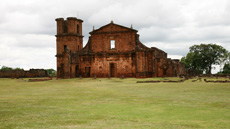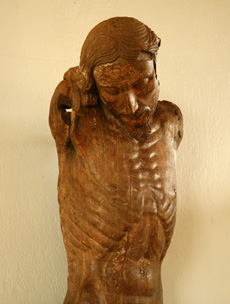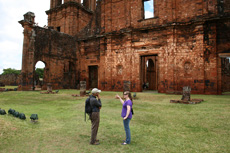
|
|
Madonna |
Utopia – Happiness – Jesuit Missions – Seductive idea
According to the Cambridge dictionary Utopia is defined as “a state where everyone is happy”. All of us may not agree with this definition, since the word is quite overloaded and seems to be interpreted differently by almost everyone I talked to. The Colombia Encyclopedia defines Utopia as “an ideal state where all is ordered for the best for humanity as a whole and where the evils of society, such as poverty and misery, have been eliminated”. Already we have significant disagreement between these two widely used and respected sources; the first is tautologically equivalent to unreachable, while the second may perhaps be achieved through very hard work.
 |
|
Mission |
So it seems that the concept of Utopia is related to another complicated and inexplicable state, that of happiness. Happiness itself is a topic that can fill volumes so I will briefly summarize my findings and opinions. Research seems to show that money and good fortune does not alter a persons happiness permanently, and that people with money spend more time in unpleasant states, such as tension and stress. I empirically agree with the concept of “baseline happiness”, where each person has a baseline level of happiness that they return to after sufficient passage of time past the occurrence of either a good or bad event. i.e. even after winning the lottery you will return to your baseline happiness after a year or so. So I ask: “Does this mean that people with a sufficiently low baseline happiness are to be excluded from any Utopia?” The answer to that, is as they say, beyond the scope of this paper…
 |
|
Guarani art |
The Jesuit Missions in this corner of Paraguay, Argentina, and Brazil tried to develop a Utopian society and the results can either be described as communal and collective bliss, or an oppressive theocratic oligarchy. In my brief foray into this subject I discovered that by the norms of the times the Jesuit communities had a much shorter work week (only six hours as opposed to ten-fourteen for contemporary Europeans) and plenty of time for leisure and reflection. Looking at the art and sculpture of the Guarani, the indigenous people entrusted to Jesuit stewardship, I would venture to guess that it is the work of proud people. It is hard to imagine unhappy, oppressed people creating such beautiful and peaceful looking artwork, for the marks of unhappiness are sure to show up in one’s work. But the interpretations are my own and it brings me to the last observation I want to make about Utopia.
 |
|
Ruins |
The idea of Utopia is strong and powerful that even if we do not live in one, it is seductive to believe that one exists somewhere, either in another geographical location, or in times past, or in times to come. Mariners scouring the seas for Atlantis and adventurers seeking Lost Worlds in the jungle attest to this. So why don’t we all believe, just for the next hour or so that the Guarani lived in a Jesuit sponsored Utopia? It will make us feel better!!
I feel that utopia is for the most part tends to be short lived and when actually rubber meets the road, harsh reality sets in that may ultimately replace utopia.
In Hindu literature “Ramayana”, Ram Rajya (country ruled by the king Ram) was where everybody was very happy and contended. Even that came to an abrupt end when Ram had to send his queen Seeta to a deep forest. Thus the thought of utopia is very pleasant, but it is hard to achieve for a prolonged period of time in the real life.
Do you agree?
I like the approach they take in Bhutan, where they measure the national Gross Domestic Happiness. Contrast that to most Western societies that measure Gross Domestic Product. Would you prefer to be tasked with making “Product” or “Happiness”?
Pienso que Utopia remite, en occidente, además de al libro de T. More, a su significado de ” que está en ningúna parte – ningún lugar”.
América era en ese entonces – circa 1500- el Nuevo Mundo. Desconocido.
Hombre Nuevo. A Descubrir.
Con todas las paradojas con que llegaba el Renacimiento hasta aquí…
Me ha encantado, conocerlos a ambos, buscando por todos los rincones de Sudamérica, lo que tambien se puede buscar en cualquier viaje espiritual, en un libro, o en cualquier lugar del mundo.
Buenos Aires, Dic 27 2008